Scott Lynch's Blog, page 5
March 28, 2012
RANGE OF GHOSTS (I): What We Talk About When We Talk About Bear
So, in case my incessant noise hadn't already made it clear, today was release day for Elizabeth Bear's brand-shiny-new epic fantasy, Range of Ghosts.

Honesty compels me to disclaim that this lovely lady is my better half, my girlfriend, my significant other, my partner. So, obviously, I have a vested emotional interest in seeing it do well for her... and you would earn my undying gratitude if you could just buy twenty or thirty copies (you don't need to eat this month, right?) as soon as possible.
Powells | Mysterious Galaxy | Barnes & Noble | Amazon
Now, with that disclaimer out of the way... well, look, you either trust me on this or you don't, and if you don't then no amount of fan-dancing on my behalf can possibly convince you that I genuinely love Bear's work, so you might as well mosey off and screw yourself while the rest of us talk. It's a touchy situation when two professional authors shack up together (even for long-distance relationship values of 'shack up'); there are no guarantees they'll like one another's work, and it takes big hearts to overcome fundamental aesthetic disagreements. So it's been quite a relief, as she's re-read my stuff and I've delved into her mountain of short fiction (having read most of her longer works) that, minor quibbles aside, we both really like what the other one writes.
Virtually everything that I appreciate about Bear's work is crystallized in Range of Ghosts, her first full-on essay into unbridled epic fantasy territory. It's got Big Sweeping Ideas in Big Damn Landscapes for Big Damn Stakes, but it's written with Bear's characteristic efficiency and her utter disdain for faffing about. No gentle sixty or seventy page introduction to idyllic rural life before clouds cover the sun. No chapter after chapter of glacial Bildungsroman with a thick-witted teenager. The plot opens hard and fast and doesn't let up for 330 pages... for all that this is a big book in conception, it's lean and never listless.
This is a fantasy novel with a distinctly non-European flavor, set in a rolling phantasmagorical Asiascape with vibrant analogs of Mongol, Persian, Chinese, Indian, and Arabic cultures (though they are nothing so lame and shallow as mere analogs). Think of the cultures that spanned the eastern portions of what was once called the "Silk Road," separated by vast harsh distances but intimately linked by trade. The world is more than numinous; the sky itself changes to reflect the prevailing paradigms of the people who live in each great region. In some places the sun sets in the west, in others it sets in the east, and the vaults of the heavens will re-order themselves in an instant (from a mortal perspective) as a character crosses a border.
Bear isn't a writer one goes to for pulpy dehumanization; even her antagonists have friends and loved ones supporting them. She isn't a writer who provides easy wish-fulfillment; Range of Ghosts is all about one of her recurring themes, which is the price of everything. The price of power... the price of survival... the price of revenge... the price of living itself. All of the characters in Range of Ghosts are constantly measuring their desires against whatever currency their lives, souls, and lifestyles represent. Nothing is ever free or unexamined. Nothing is ever had without sacrifice or consequences.
Bear isn't a writer one goes to for consolation or condescension. This isn't a treacly fantasy about how everything will come right in the end, how everything will be worthwhile, how the troubles and mysteries of living will sort themselves out just as soon as the right person has a sword shoved into them. Like all of Bear's work, this is a tale of grace notes hidden and concealed along the way, of small victories and moments to savor, even along the path that leads to heartbreak and hell.
To say that Range of Ghosts is worth your time is to do it a major injustice through understatement.
My take on the novel will be spread out in several installments across the rest of the week, so keep it in your thoughts...

Honesty compels me to disclaim that this lovely lady is my better half, my girlfriend, my significant other, my partner. So, obviously, I have a vested emotional interest in seeing it do well for her... and you would earn my undying gratitude if you could just buy twenty or thirty copies (you don't need to eat this month, right?) as soon as possible.
Powells | Mysterious Galaxy | Barnes & Noble | Amazon
Now, with that disclaimer out of the way... well, look, you either trust me on this or you don't, and if you don't then no amount of fan-dancing on my behalf can possibly convince you that I genuinely love Bear's work, so you might as well mosey off and screw yourself while the rest of us talk. It's a touchy situation when two professional authors shack up together (even for long-distance relationship values of 'shack up'); there are no guarantees they'll like one another's work, and it takes big hearts to overcome fundamental aesthetic disagreements. So it's been quite a relief, as she's re-read my stuff and I've delved into her mountain of short fiction (having read most of her longer works) that, minor quibbles aside, we both really like what the other one writes.
Virtually everything that I appreciate about Bear's work is crystallized in Range of Ghosts, her first full-on essay into unbridled epic fantasy territory. It's got Big Sweeping Ideas in Big Damn Landscapes for Big Damn Stakes, but it's written with Bear's characteristic efficiency and her utter disdain for faffing about. No gentle sixty or seventy page introduction to idyllic rural life before clouds cover the sun. No chapter after chapter of glacial Bildungsroman with a thick-witted teenager. The plot opens hard and fast and doesn't let up for 330 pages... for all that this is a big book in conception, it's lean and never listless.
This is a fantasy novel with a distinctly non-European flavor, set in a rolling phantasmagorical Asiascape with vibrant analogs of Mongol, Persian, Chinese, Indian, and Arabic cultures (though they are nothing so lame and shallow as mere analogs). Think of the cultures that spanned the eastern portions of what was once called the "Silk Road," separated by vast harsh distances but intimately linked by trade. The world is more than numinous; the sky itself changes to reflect the prevailing paradigms of the people who live in each great region. In some places the sun sets in the west, in others it sets in the east, and the vaults of the heavens will re-order themselves in an instant (from a mortal perspective) as a character crosses a border.
Bear isn't a writer one goes to for pulpy dehumanization; even her antagonists have friends and loved ones supporting them. She isn't a writer who provides easy wish-fulfillment; Range of Ghosts is all about one of her recurring themes, which is the price of everything. The price of power... the price of survival... the price of revenge... the price of living itself. All of the characters in Range of Ghosts are constantly measuring their desires against whatever currency their lives, souls, and lifestyles represent. Nothing is ever free or unexamined. Nothing is ever had without sacrifice or consequences.
Bear isn't a writer one goes to for consolation or condescension. This isn't a treacly fantasy about how everything will come right in the end, how everything will be worthwhile, how the troubles and mysteries of living will sort themselves out just as soon as the right person has a sword shoved into them. Like all of Bear's work, this is a tale of grace notes hidden and concealed along the way, of small victories and moments to savor, even along the path that leads to heartbreak and hell.
To say that Range of Ghosts is worth your time is to do it a major injustice through understatement.
My take on the novel will be spread out in several installments across the rest of the week, so keep it in your thoughts...
Published on March 28, 2012 06:18
March 27, 2012
Locke Lamora Read-Along Bonus #4: YOU SUCK, LYNCH
"Don't fall for all the commerical hype purporting that this book is the new fantasy. The only fantasy was in the author's head and he was not able to communicate that well at all. Which is too bad because some of the images are stark and clear and riveting and drew me deeper and deeper into the book.....against my will. The book is arrogant, clumsy, baffling, and too cute, too ingeneous, too contrived for words. The best bits were never developed. The best characters are the vicious sharks of Camorr and I wish they had eaten my copy."
That's my all-time favorite anonymous Barnes & Noble review of TLOLL. Especially the last sentence. If you're going to trash my work, aim for a memorable closer. It's so much more fun than mere petulance.
Honest dislike of my work has become a very easy thing for me to live with (as differentiated from dishonest/incomplete readings of a text and false/stupid personal accusations, which will always hit my small thermal exhaust port) because I have embraced a little magic spell that goes like this: De gustibus non est disputandum. Nothing in the history of human art has been universally popular or acclaimed. Nothing. Educated people of good faith and taste are still arguing the merits of War and Peace, for crying out loud. You think it shocks or offends me to discover that not everyone adores The Lies of Locke Lamora? Fucking get real.
Naturally, a certain percentage of the book's critics are barely capable of using flush toilets and shouldn't be allowed out in public unless rolled in three layers of Nerf for their own safety. Another portion are the sorts of narcissists who are genuinely shocked each time someone else writes a book without their permission and oversight. And yet I think the vast majority of the book's critics are probably on to something... either sincerely incapable of interfacing with the work or accurately noting certain defects that preclude their enjoyment. Accurately? Yes indeed. Over the years I've come to strongly agree on several points with many critics of TLOLL.
It's only natural to look back at something written seven-odd years ago in the light of how I'd write it now (or, no doubt, years from now). That isn't to say I'll ever do so. I happen to think that's another crippling variety of auctorial insanity. The Lies of Locke Lamora reflects the state of my craft and my person in 2004-5, and for better or for worse, it always shall. Much as I'd love to smooth it out, rewrite some of the rougher patches, clarify certain things, and slightly adjust a few of the characters, I think actually engaging in that sort of behavior is a trap. It's not my fucking job (and it shouldn't be my privilege) to keep old books in a state of perpetual revision. They're out! The children have left home. The text has been read. You've seen it, readers, and you can't un-see it. George Lucas is clearly going to be changing piddly, trivial, ridiculous shit in the original Star Wars films until he drops dead... and while I'd love those piles of money, I don't want that baggage. That myopia.
So The Lies of Locke Lamora is going to look as it does now... forever. There will never be an Author's New and Amended Edition, reflecting how I write and feel when I'm 35 or 40 or 96, if I still have a pulse when those milestones roll past. Only in the most extreme circumstances would I consider that sort of thing, for a work that I considered fundamentally damaged or published contrary to my vision. "In the Stacks," for example, will be given a revision and an expansion, due to the fact that it was composed during the very darkest days of my untreated depression. As lovely as the response to it has been, I think it deserves better than I was able to give it (and meant to give it). The Lies of Locke Lamora, on the other hand, suffered from no lack of enthusiasm or energy during its composition. Its failures are honest and unmitigated ones.
Let me share a few of my thoughts on the defects of my work with you:
I think the most obvious structural incongruity in The Lies of Locke Lamora is that the interlude chapters, which start out as fully-developed narrative episodes, inelegantly transition to historical lectures and omniscient anecdotes. While I'd argue that most of them are still very relevant, and a couple are even essential, there's really no reason I couldn't (with a little more reflection) have made them in-universe infodumps rather than Voice of God. They could have easily been stories or lessons from Father Chains; a little diligent framing on my part and the incongruity would have been ironed smooth. Alas.
Several astute readers have pointed out that what transpires between Locke and Felice is technically an abrogation of Felice's duties as a prostitute; that she swapped the terms of their encounter from foreplay to platonic massage awfully quick for someone who might want to stay employed. All of this is true. My excuse is that there is as-yet unrevealed backstory between some of the Bastards and some of the Guilded Lilies (and thus she had more liberty than a stranger), going back to when Chains did them a big favor years before Locke was born. However, I catastrophically failed to allude to this in the actual text. Pleading apocrypha when the apocrypha is still secret is not the equivalent of having written well.
Many readers have issues with the swearing in TLOLL, and while I do sympathize, I have to confess to feeling completely unmoved over the matter. This is a novel in which people are drowned alive, immersed in piss, strangled, stabbed, poisoned, eaten by sharks, and viciously tortured in myriad ways. And yet they want to complain about the language? I simply do not accept the notion that loose obscenities (words not anchored in hateful attacks upon human identity) have any ethical dimension whatsoever. They're part of the great tapestry of our linguistic heritage, and if you're squeamish about them, I'm sorry... but that's your own problem. Here's another magic spell of which I'm very fond, from the old Roman poet Catullus:
Nam castum esse decet pium poetam
ipsum, versiculos nihil necessest
Loosely translated: It's good and proper for a poet to be moral, but in no way necessary for his poems. Interestingly, if you read the entirety of that poem framing that sentiment, Catullus 16, you'll find that it's eye-scorchingly vulgar. Catullus, like Martial, wrote stuff that would make any latter-day moral scold have a coronary. Keep that in mind next time some self-righteous windbag starts bloviating about the upright virtues of the classical world... those old Greeks and Romans bowed to nobody when it came to blazing vulgarity.
I suppose that's much more of a self-defense than a self-criticism, so I will say that there are many places in the book where I would, with deeper reflection or more developed aesthetic sense, not have scattered obscenities quite so haphazardly, but reserved them for greater impact and more creative conjunctions.
I am not entirely happy with the way I deal with violent action in TLOLL. There is, I think, a little too much precision. Too much description of exact distances. Too little reflection of uncertainty, panic, and desperation as seen from the points of view of the participants. You can see a gradual evolution from the style of TLOLL to a more, er, "impressionistic" style in Republic. I suspect that this is because when TLOLL was written I was still a probationary firefighter, and by the time I got to Republic I'd had several years in which to experience roaring fires, claustrophobia, melting insulation, tumbling walls, hot ash burns, collapsing ceilings, and the like. My personal experience of risk and physical hardship has deepened since TLOLL, and my notion of what's important in the description of action has changed.
I am also not best pleased with my portrait of the cultural mix in Camorr. I covered the Vadrans and the Therins quite nicely, but I did not adequately follow through on my intention to describe the Okanti and the Syresti, the dark-skinned people from over the southern seas. The Okanti are a disapora people and the Syresti are a little empire that easily matches the Therins in culture, art, science, and warmaking ability. Red Seas and Republic more accurately describe their place in the scheme of things. While there is some undeniable (and humanly unavoidable, I think) racial prejudice, the Therins have never been allowed to feel anything like the unbridled contempt Europeans once nurtured for Africans. The Syresti and Okanti always enjoyed technological parity with their would-be invaders, and punched them in their faces until invasions stopped happening. The Okanti have only dispersed on account of a civil war, complicated by some Supernatural Horribleness I might describe down the line.
I give a shit about this in the context of TLOLL because it creates an incongruous visual impression of what I meant the Therin city-states to look like. There are far more dark-skinned cast members from Red Seas on, and as a result of my inattention in TLOLL, it looks like it suddenly started raining black people between books. Had I been on the ball, I would have clued readers in to the fact that they were there all along.
I am belatedly ashamed of the fact that I used crossbow "quarrel" and "bolt" as mere synonyms.
Last but not least, there is too much damned scaffolding for some of my prose in TLOLL. Too much description of meaningless character action (sighing, sighing, so much sighing!) rather than meaningful activity; far too much use of italics to emphasize when characters are saying something dramatic. All of these buttresses speak to a first-timer's lack of confidence in his work. While I certainly wouldn't just do a global excision of all the italics in the book, I bet I could find at least a hundred instances of italicization that could be thrown out without consequence. Once is happenstance; twice is coincidence; a hundred times is YOU SUCK, LYNCH.
That's my all-time favorite anonymous Barnes & Noble review of TLOLL. Especially the last sentence. If you're going to trash my work, aim for a memorable closer. It's so much more fun than mere petulance.
Honest dislike of my work has become a very easy thing for me to live with (as differentiated from dishonest/incomplete readings of a text and false/stupid personal accusations, which will always hit my small thermal exhaust port) because I have embraced a little magic spell that goes like this: De gustibus non est disputandum. Nothing in the history of human art has been universally popular or acclaimed. Nothing. Educated people of good faith and taste are still arguing the merits of War and Peace, for crying out loud. You think it shocks or offends me to discover that not everyone adores The Lies of Locke Lamora? Fucking get real.
Naturally, a certain percentage of the book's critics are barely capable of using flush toilets and shouldn't be allowed out in public unless rolled in three layers of Nerf for their own safety. Another portion are the sorts of narcissists who are genuinely shocked each time someone else writes a book without their permission and oversight. And yet I think the vast majority of the book's critics are probably on to something... either sincerely incapable of interfacing with the work or accurately noting certain defects that preclude their enjoyment. Accurately? Yes indeed. Over the years I've come to strongly agree on several points with many critics of TLOLL.
It's only natural to look back at something written seven-odd years ago in the light of how I'd write it now (or, no doubt, years from now). That isn't to say I'll ever do so. I happen to think that's another crippling variety of auctorial insanity. The Lies of Locke Lamora reflects the state of my craft and my person in 2004-5, and for better or for worse, it always shall. Much as I'd love to smooth it out, rewrite some of the rougher patches, clarify certain things, and slightly adjust a few of the characters, I think actually engaging in that sort of behavior is a trap. It's not my fucking job (and it shouldn't be my privilege) to keep old books in a state of perpetual revision. They're out! The children have left home. The text has been read. You've seen it, readers, and you can't un-see it. George Lucas is clearly going to be changing piddly, trivial, ridiculous shit in the original Star Wars films until he drops dead... and while I'd love those piles of money, I don't want that baggage. That myopia.
So The Lies of Locke Lamora is going to look as it does now... forever. There will never be an Author's New and Amended Edition, reflecting how I write and feel when I'm 35 or 40 or 96, if I still have a pulse when those milestones roll past. Only in the most extreme circumstances would I consider that sort of thing, for a work that I considered fundamentally damaged or published contrary to my vision. "In the Stacks," for example, will be given a revision and an expansion, due to the fact that it was composed during the very darkest days of my untreated depression. As lovely as the response to it has been, I think it deserves better than I was able to give it (and meant to give it). The Lies of Locke Lamora, on the other hand, suffered from no lack of enthusiasm or energy during its composition. Its failures are honest and unmitigated ones.
Let me share a few of my thoughts on the defects of my work with you:
I think the most obvious structural incongruity in The Lies of Locke Lamora is that the interlude chapters, which start out as fully-developed narrative episodes, inelegantly transition to historical lectures and omniscient anecdotes. While I'd argue that most of them are still very relevant, and a couple are even essential, there's really no reason I couldn't (with a little more reflection) have made them in-universe infodumps rather than Voice of God. They could have easily been stories or lessons from Father Chains; a little diligent framing on my part and the incongruity would have been ironed smooth. Alas.
Several astute readers have pointed out that what transpires between Locke and Felice is technically an abrogation of Felice's duties as a prostitute; that she swapped the terms of their encounter from foreplay to platonic massage awfully quick for someone who might want to stay employed. All of this is true. My excuse is that there is as-yet unrevealed backstory between some of the Bastards and some of the Guilded Lilies (and thus she had more liberty than a stranger), going back to when Chains did them a big favor years before Locke was born. However, I catastrophically failed to allude to this in the actual text. Pleading apocrypha when the apocrypha is still secret is not the equivalent of having written well.
Many readers have issues with the swearing in TLOLL, and while I do sympathize, I have to confess to feeling completely unmoved over the matter. This is a novel in which people are drowned alive, immersed in piss, strangled, stabbed, poisoned, eaten by sharks, and viciously tortured in myriad ways. And yet they want to complain about the language? I simply do not accept the notion that loose obscenities (words not anchored in hateful attacks upon human identity) have any ethical dimension whatsoever. They're part of the great tapestry of our linguistic heritage, and if you're squeamish about them, I'm sorry... but that's your own problem. Here's another magic spell of which I'm very fond, from the old Roman poet Catullus:
Nam castum esse decet pium poetam
ipsum, versiculos nihil necessest
Loosely translated: It's good and proper for a poet to be moral, but in no way necessary for his poems. Interestingly, if you read the entirety of that poem framing that sentiment, Catullus 16, you'll find that it's eye-scorchingly vulgar. Catullus, like Martial, wrote stuff that would make any latter-day moral scold have a coronary. Keep that in mind next time some self-righteous windbag starts bloviating about the upright virtues of the classical world... those old Greeks and Romans bowed to nobody when it came to blazing vulgarity.
I suppose that's much more of a self-defense than a self-criticism, so I will say that there are many places in the book where I would, with deeper reflection or more developed aesthetic sense, not have scattered obscenities quite so haphazardly, but reserved them for greater impact and more creative conjunctions.
I am not entirely happy with the way I deal with violent action in TLOLL. There is, I think, a little too much precision. Too much description of exact distances. Too little reflection of uncertainty, panic, and desperation as seen from the points of view of the participants. You can see a gradual evolution from the style of TLOLL to a more, er, "impressionistic" style in Republic. I suspect that this is because when TLOLL was written I was still a probationary firefighter, and by the time I got to Republic I'd had several years in which to experience roaring fires, claustrophobia, melting insulation, tumbling walls, hot ash burns, collapsing ceilings, and the like. My personal experience of risk and physical hardship has deepened since TLOLL, and my notion of what's important in the description of action has changed.
I am also not best pleased with my portrait of the cultural mix in Camorr. I covered the Vadrans and the Therins quite nicely, but I did not adequately follow through on my intention to describe the Okanti and the Syresti, the dark-skinned people from over the southern seas. The Okanti are a disapora people and the Syresti are a little empire that easily matches the Therins in culture, art, science, and warmaking ability. Red Seas and Republic more accurately describe their place in the scheme of things. While there is some undeniable (and humanly unavoidable, I think) racial prejudice, the Therins have never been allowed to feel anything like the unbridled contempt Europeans once nurtured for Africans. The Syresti and Okanti always enjoyed technological parity with their would-be invaders, and punched them in their faces until invasions stopped happening. The Okanti have only dispersed on account of a civil war, complicated by some Supernatural Horribleness I might describe down the line.
I give a shit about this in the context of TLOLL because it creates an incongruous visual impression of what I meant the Therin city-states to look like. There are far more dark-skinned cast members from Red Seas on, and as a result of my inattention in TLOLL, it looks like it suddenly started raining black people between books. Had I been on the ball, I would have clued readers in to the fact that they were there all along.
I am belatedly ashamed of the fact that I used crossbow "quarrel" and "bolt" as mere synonyms.
Last but not least, there is too much damned scaffolding for some of my prose in TLOLL. Too much description of meaningless character action (sighing, sighing, so much sighing!) rather than meaningful activity; far too much use of italics to emphasize when characters are saying something dramatic. All of these buttresses speak to a first-timer's lack of confidence in his work. While I certainly wouldn't just do a global excision of all the italics in the book, I bet I could find at least a hundred instances of italicization that could be thrown out without consequence. Once is happenstance; twice is coincidence; a hundred times is YOU SUCK, LYNCH.
Published on March 27, 2012 05:20
March 25, 2012
The Ballad of Captain Placeholder
Stuff's coming, kids, have no fear. I desperately needed sleep last night, and today I got up and crossed the state line to help move six million tons of stuff at The Source, the greatest comics and games store for hundreds of miles in any direction. It was heartening to see so many geek volunteers out in force to heave stuff around. I came home reduced to a state of noodle-hood. I will return.
Published on March 25, 2012 22:13
March 19, 2012
Shamelessly Cute Baby Picture Is Shameless
Did I mention that I have a niece, Mayson? Nearly a year old? And isn't it cute how I say 'have' as though I were taking any sort of credit for her existence or care? Heh. Well, she's adorable, and when she's in high school I think she's going to be about ten feet tall.
I'm also pretty sure she's a future author. The evidence:

Note:
1. She's indoors, yet wearing sunglasses.
2. It's the middle of the day, and she's wearing pajamas and a blanket.
3. She already has an Evil Genius Planning Face.
I'm also pretty sure she's a future author. The evidence:

Note:
1. She's indoors, yet wearing sunglasses.
2. It's the middle of the day, and she's wearing pajamas and a blanket.
3. She already has an Evil Genius Planning Face.
Published on March 19, 2012 18:29
March 18, 2012
Locke Lamora Read-Along Bonus #3: Early Visual Aids
While I very, very rarely create characters that are visually based on living (or once-living) actors and celebrities, it does happen from time to time. We all snatch inspiration and style where we can find it. The only sin in this department, I think, is to use a celebrity's name as a lazy shorthand replacement for actual description.
I'll share some of my formative visual influences with you now. To be clear-- I am not match-making after the fact and I am NOT "dreamcasting" a live adaptation of my work. These are the only characters that had a genuine real-life model while I was conceiving and writing The Lies of Locke Lamora; that's why the list is so relatively limited.

My initial conception of Father Chains was largely drawn from photos of author Dan Simmons. Weathered, sturdy, and wise, as I imagined things; a broad and towering shape to dominate a child's world, at once compelling and comforting. Simmons was and is a brilliant writer. It's a shame that in recent years he's gone down the rabbit hole of outright bigotry with his credulous, self-important screeds. Ah, well, we'll always have Hyperion.
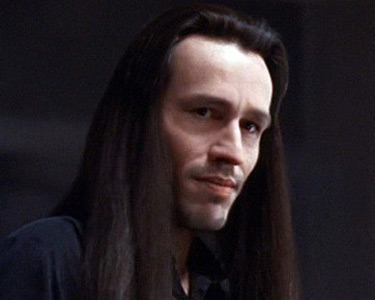
For the Gray King, I always had an eye on Michael Wincott. It's cliche to call an actor like this "underrated," since he's not underrated by anyone who actually looks for his work. He had a part in several major cult films including The Crow, the 2002 version of The Count of Monte Cristo, and Alien: Resurrection (in which he and his rag-tag band of extremely watchable rogues were the only bright spot). Come to think of it, he was Alan Rickman's straight man in Costner's crap Robin Hood flick, helping to anchor the only palatable bits of that movie, too. He was also superb in the otherwise bleh Along Came A Spider, one of those millennial "super serial killer" films that were stamped out by the half-dozen. Curriculum vitae aside, he's got wolfish looks, a gravelly voice, and a sinister presence he can turn on or off like a smile.

Capa Vencarlo Barsavi needed to be a heavy fellow; heavy with age, heavy with responsibility, a human gravity well. Every seam on his face ought to tell a story; his eyes ought to flick, nervous but kingly, behind wrinkled layers of leathery jowl. One partial model was Brian Cox circa 2003 (as Stryker in X2: What The Hell is the Official Subtitle of the Second X-Men Movie Anyway?) but eventually I had to go with Kenneth Cranham. He has the lived-in face, the heavy physique, and the easy power of Barsavi. In recent years, he was Pompey Magnus on Rome and Field Marshal Wilhelm Keitel in Valkyrie.
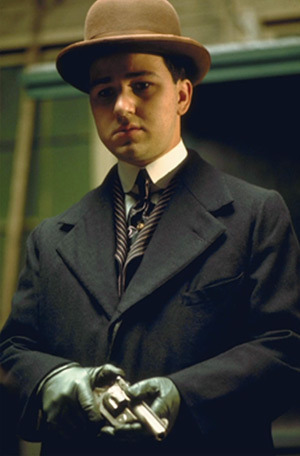
For Jean Tannen, my initial model was Bruno Kirby as the young Pete Clemenza in The Godfather Part II. Round but spry, dapper rather than classically handsome, capable of instant deadly violence without worry or warning-- Clemenza was all those things, and a gluttonous lover of life. Bruno Kirby was also seen in the imperfect but fascinating film adaptation of Donnie Brasco.
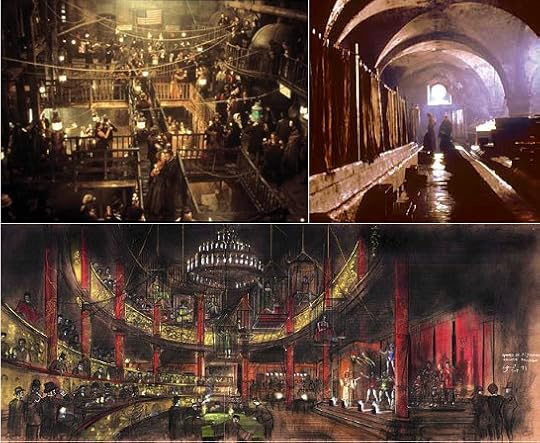
I'd be remiss in not mentioning the production designs of Dante Ferretti. What? Who the hell pays attention to production designers? Well, for several years in my late teens, I had an Interview With the Vampire film poster above my desk, and the name DANTE FERRETTI was at eye level whenever I was sitting and typing. Eventually, I got curious and googled the name, and discovered that he was responsible for the iconic look of a whole slew of movies I admired in some fashion, including but not limited to: The Name of the Rose, The Adventures of Baron Munchausen, Titus, Casino, The Age of Innocence, and Gangs of New York. It was his work on that last film that most vividly compelled me-- his set design is astounding, historical and phantasmagorical all at once. I knew the first time I saw it that I had been handed a seed pearl for the grimy splendor of Camorr.
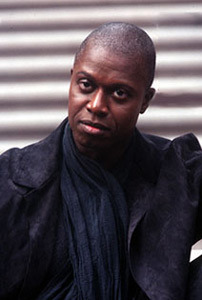
SUPER SPECIAL ADDED BONUS! This is one of those very, very rare occasions I mentioned above, and it's not in Lies. The character of Jasmer Moncraine, the dodgy Syresti impresario in The Republic of Thieves, is pretty explicitly based on Andre Braugher, one of my favorite actors of all time. You might remember him as Thomas Searles in Glory, or for his amazing portrayal of Frank Pembleton on Homicide: Life on the Street. He was also in The Mist and the 2004 version of Salem's Lot, the miniseries Thief and the recent series Men of a Certain Age. He's fucking brilliant; I'd watch him play a five-year-old white child. I'd watch him play Lady Macbeth. I'd watch him play me.
SUPER DUPER SPECIAL ADDED BONUS REDUX: Just because you've been so well-behaved, here's another cartoon from the marvelous Anna-Maria Jung. It's Locke... or a parallel universe version of Locke, doing what he SHOULD have done before setting sail in Red Seas Under Red Skies.

I'll share some of my formative visual influences with you now. To be clear-- I am not match-making after the fact and I am NOT "dreamcasting" a live adaptation of my work. These are the only characters that had a genuine real-life model while I was conceiving and writing The Lies of Locke Lamora; that's why the list is so relatively limited.

My initial conception of Father Chains was largely drawn from photos of author Dan Simmons. Weathered, sturdy, and wise, as I imagined things; a broad and towering shape to dominate a child's world, at once compelling and comforting. Simmons was and is a brilliant writer. It's a shame that in recent years he's gone down the rabbit hole of outright bigotry with his credulous, self-important screeds. Ah, well, we'll always have Hyperion.

For the Gray King, I always had an eye on Michael Wincott. It's cliche to call an actor like this "underrated," since he's not underrated by anyone who actually looks for his work. He had a part in several major cult films including The Crow, the 2002 version of The Count of Monte Cristo, and Alien: Resurrection (in which he and his rag-tag band of extremely watchable rogues were the only bright spot). Come to think of it, he was Alan Rickman's straight man in Costner's crap Robin Hood flick, helping to anchor the only palatable bits of that movie, too. He was also superb in the otherwise bleh Along Came A Spider, one of those millennial "super serial killer" films that were stamped out by the half-dozen. Curriculum vitae aside, he's got wolfish looks, a gravelly voice, and a sinister presence he can turn on or off like a smile.

Capa Vencarlo Barsavi needed to be a heavy fellow; heavy with age, heavy with responsibility, a human gravity well. Every seam on his face ought to tell a story; his eyes ought to flick, nervous but kingly, behind wrinkled layers of leathery jowl. One partial model was Brian Cox circa 2003 (as Stryker in X2: What The Hell is the Official Subtitle of the Second X-Men Movie Anyway?) but eventually I had to go with Kenneth Cranham. He has the lived-in face, the heavy physique, and the easy power of Barsavi. In recent years, he was Pompey Magnus on Rome and Field Marshal Wilhelm Keitel in Valkyrie.

For Jean Tannen, my initial model was Bruno Kirby as the young Pete Clemenza in The Godfather Part II. Round but spry, dapper rather than classically handsome, capable of instant deadly violence without worry or warning-- Clemenza was all those things, and a gluttonous lover of life. Bruno Kirby was also seen in the imperfect but fascinating film adaptation of Donnie Brasco.

I'd be remiss in not mentioning the production designs of Dante Ferretti. What? Who the hell pays attention to production designers? Well, for several years in my late teens, I had an Interview With the Vampire film poster above my desk, and the name DANTE FERRETTI was at eye level whenever I was sitting and typing. Eventually, I got curious and googled the name, and discovered that he was responsible for the iconic look of a whole slew of movies I admired in some fashion, including but not limited to: The Name of the Rose, The Adventures of Baron Munchausen, Titus, Casino, The Age of Innocence, and Gangs of New York. It was his work on that last film that most vividly compelled me-- his set design is astounding, historical and phantasmagorical all at once. I knew the first time I saw it that I had been handed a seed pearl for the grimy splendor of Camorr.

SUPER SPECIAL ADDED BONUS! This is one of those very, very rare occasions I mentioned above, and it's not in Lies. The character of Jasmer Moncraine, the dodgy Syresti impresario in The Republic of Thieves, is pretty explicitly based on Andre Braugher, one of my favorite actors of all time. You might remember him as Thomas Searles in Glory, or for his amazing portrayal of Frank Pembleton on Homicide: Life on the Street. He was also in The Mist and the 2004 version of Salem's Lot, the miniseries Thief and the recent series Men of a Certain Age. He's fucking brilliant; I'd watch him play a five-year-old white child. I'd watch him play Lady Macbeth. I'd watch him play me.
SUPER DUPER SPECIAL ADDED BONUS REDUX: Just because you've been so well-behaved, here's another cartoon from the marvelous Anna-Maria Jung. It's Locke... or a parallel universe version of Locke, doing what he SHOULD have done before setting sail in Red Seas Under Red Skies.

Published on March 18, 2012 03:51
March 11, 2012
Locke Lamora Read-Along Bonus #2: Other Roads Not Taken
I meant to put this up yesterday, but I was out at a birthday party and crashed early once I got home. Without further ado, your weekly dose of hidden lore:
*****
After digging through my papers this week, I was surprised to find just how many scraps, notes, and lists had survived from the Early Days of The Lies of Locke Lamora. Far more than I had thought, and quite embarrassing in some respects. Some of the dumbest ideas I ever had are preserved like flies in amber, just waiting to go into the archives for posterity. Probably the NIU archives, since Lynne Thomas will kill me with an axe if anything else happens. Anyhow, here are some fun facts to know and tell about things that were changed or discarded before the final draft:
The sequel to The Lies of Locke Lamora was originally going to be called The Best Heretic Ever. The rough plot sketch was that Locke was going to pose as a religious prophet of some sort and wacky hijinks were going to ensue. The Best Heretic Ever was shelved about a quarter of the way through writing Lies, as I gained confidence in the world and the characters and felt free to detach myself from my previous outlines.
The earliest cast list for Lies features four Capas: Jacobo, Barsavi, Vorchenza, and Riga. All of them were meant to be murdered (I know this will shock my readers) but it wasn't long before I combined them all into the solitary godfather figure of Capa Barsavi. The Gray King was originally called the Pale King. Dona Vorchenza was originally called "Dona Sarabella."
From the same cast list, the first roster of the Gentlemen Bastards: Locke Lamora, age 28; "Gentle" Jean Tannen, age 31; "Long Tall" Galdo, age 26, and Venti Loose-Lips, age 22. Father Chains was originally going to be called, I shit you not, "Rude Trevor," age 40. This list also appears to have two younger apprentice characters, Petrava and Tomsa (ages 16 and 17) and a character named "Father Caladon." The words "Father Chains?" are written next to his name. This leads me to believe I had originally meant for a false priest to be some sort of adjunct member of the gang, and from him I grew the notion of chaining this priest to his temple, before finally deciding to roll this character in with that of the gang's mentor figure.
"Long Tall" Galdo must be a reference to a character I played in several roleplaying games named Long Tall John. John was four and a half feet tall, a mercenary swordsman, and a complete idiot who managed to lead a charmed life. He popped up in several milieus and none of the games lasted. Overt comic relief characters don't do much for campaign longevity.
The Thiefmaker was originally a double act, an old man and woman called the Maker and the Mother.
A more developed cast list from a few months later is closer to the final product but still shows some deviations. Conte is listed as "Corte." Two additional noble families, the Agnellas and the Garamonds, are listed as Five Towers clans, though I seem not to have found any use for them. Bug is on this list, and "Long Tall" Galdo" has been transmuted to Calo and Galdo Sanza. Nazca's on this list as "Nasca," and there are two other female members of the Barsavi Clan: "Firavina" and "Cienna." Her brothers Anjais and Pachero were originally called "Udezo" and "Roje."
The Falconer was originally called "Marek." I decided early on that this wasn't mysterious enough; I wanted to bring in the old tradition of sorcerers being secretive about their true names. "Falconer," incidentally, was the name of my Knights of the Old Republic II Jedi Guardian.
(Dual-wielder. Blue and silver lightsabers. Light-side Jedi forever, baby.)
This cast list also features "Runvical and Tomsa," a pair of guards at Capa Barsavi's Floating Grave. I think I meant for these guys to be some sort of running commentary/ minor comic relief, like the two dimwit guards that always manage to get caught up in the main action in J.V. Jones' Bakers' Boy books. Or, if I want to be more self-congratulatory, like Shakespeare. Regardless, I didn't find any room or use for them in the final draft.
Jean was originally a much cruder sort of fellow. His early-draft lecherousness and sarcastic foulness were passed over to the Sanzas. Also, the original Jean had no recollection of his family and claimed to have been cut out of the stomach of a large fish on the Camorr docks as an infant. He was definitely kidding about this and was never meant to be a mer-baby.
Karthain was originally called "Quarthain," but at the last minute I recalled that some GRRM guy had a city named "Quarth" in one of his obscure little books about thrones and dragons.
One discarded opening for Lies was set aside and eventually became a chapter in The Republic of Thieves called "The Undrowned Girl." Another discarded opening featured several of Capa Barsavi's men and women being murdered by the Gray King's people. Wiping out nameless red-shirts struck me as a cliched grab for attention. A third discarded opening was a sort of scholarly discourse on the sharks of Camorr bay. It read (all errors and shitty construction intact):
"Any scholar of the Therin Collegium can tell you that the Wolf Sharks of the Iron Sea are beautiful creatures when contemplated from a comfortable distance, which in their case is about two hundred and fifty overland miles. Any dockworker in the trade city of Camorr, on the other hand, can tell you that Wolf Sharks are big vicious bastards that make the warm coastal shallows around the city dangerous even if you never get your feet wet. Wolf Sharks, you see, like to jump.
"The midnight indigo of their dorsal fins and upper back tapers to a waxy gray on their ventral surfaces; their bodies are packed to bursting with muscle as thick and touch as a bull's. Unfortunately for anything else moving in the water, Wolf Sharks really are as vicious and territorial as folk wisdom has it. Wolf Shark pups floating in utero will instinctively devour their weaker siblings. While they form packs later in life, only one pup in any litter will survive to be born to salt water. They're bad enough anywhere, but few people know why the ones haunting Camorr Bay are such voracious man-eaters. The answer to that lies with Capa Vencarlo Barsavi (himself, curiously enough, a former scholar of the Therin Collegium), the crooked master of Camorr's vast underworld."
Yes, one detail that I didn't manage to work into the final story was that Capa Barsavi himself was to blame for the viciousness of Camorr Bay's predators, as he'd been feeding them enemies and failed henchmen almost nightly for twenty-two years. Although all the dangerous wildlife in Locke's world is turned up a notch or two from ours, and the seas are in places ludicrously dangerous, I have always felt bad about maligning sharks quite as shamelessly as I did in Lies. There was originally supposed to be just a bit more backstory behind their troublesome behavior.
*****
After digging through my papers this week, I was surprised to find just how many scraps, notes, and lists had survived from the Early Days of The Lies of Locke Lamora. Far more than I had thought, and quite embarrassing in some respects. Some of the dumbest ideas I ever had are preserved like flies in amber, just waiting to go into the archives for posterity. Probably the NIU archives, since Lynne Thomas will kill me with an axe if anything else happens. Anyhow, here are some fun facts to know and tell about things that were changed or discarded before the final draft:
The sequel to The Lies of Locke Lamora was originally going to be called The Best Heretic Ever. The rough plot sketch was that Locke was going to pose as a religious prophet of some sort and wacky hijinks were going to ensue. The Best Heretic Ever was shelved about a quarter of the way through writing Lies, as I gained confidence in the world and the characters and felt free to detach myself from my previous outlines.
The earliest cast list for Lies features four Capas: Jacobo, Barsavi, Vorchenza, and Riga. All of them were meant to be murdered (I know this will shock my readers) but it wasn't long before I combined them all into the solitary godfather figure of Capa Barsavi. The Gray King was originally called the Pale King. Dona Vorchenza was originally called "Dona Sarabella."
From the same cast list, the first roster of the Gentlemen Bastards: Locke Lamora, age 28; "Gentle" Jean Tannen, age 31; "Long Tall" Galdo, age 26, and Venti Loose-Lips, age 22. Father Chains was originally going to be called, I shit you not, "Rude Trevor," age 40. This list also appears to have two younger apprentice characters, Petrava and Tomsa (ages 16 and 17) and a character named "Father Caladon." The words "Father Chains?" are written next to his name. This leads me to believe I had originally meant for a false priest to be some sort of adjunct member of the gang, and from him I grew the notion of chaining this priest to his temple, before finally deciding to roll this character in with that of the gang's mentor figure.
"Long Tall" Galdo must be a reference to a character I played in several roleplaying games named Long Tall John. John was four and a half feet tall, a mercenary swordsman, and a complete idiot who managed to lead a charmed life. He popped up in several milieus and none of the games lasted. Overt comic relief characters don't do much for campaign longevity.
The Thiefmaker was originally a double act, an old man and woman called the Maker and the Mother.
A more developed cast list from a few months later is closer to the final product but still shows some deviations. Conte is listed as "Corte." Two additional noble families, the Agnellas and the Garamonds, are listed as Five Towers clans, though I seem not to have found any use for them. Bug is on this list, and "Long Tall" Galdo" has been transmuted to Calo and Galdo Sanza. Nazca's on this list as "Nasca," and there are two other female members of the Barsavi Clan: "Firavina" and "Cienna." Her brothers Anjais and Pachero were originally called "Udezo" and "Roje."
The Falconer was originally called "Marek." I decided early on that this wasn't mysterious enough; I wanted to bring in the old tradition of sorcerers being secretive about their true names. "Falconer," incidentally, was the name of my Knights of the Old Republic II Jedi Guardian.
(Dual-wielder. Blue and silver lightsabers. Light-side Jedi forever, baby.)
This cast list also features "Runvical and Tomsa," a pair of guards at Capa Barsavi's Floating Grave. I think I meant for these guys to be some sort of running commentary/ minor comic relief, like the two dimwit guards that always manage to get caught up in the main action in J.V. Jones' Bakers' Boy books. Or, if I want to be more self-congratulatory, like Shakespeare. Regardless, I didn't find any room or use for them in the final draft.
Jean was originally a much cruder sort of fellow. His early-draft lecherousness and sarcastic foulness were passed over to the Sanzas. Also, the original Jean had no recollection of his family and claimed to have been cut out of the stomach of a large fish on the Camorr docks as an infant. He was definitely kidding about this and was never meant to be a mer-baby.
Karthain was originally called "Quarthain," but at the last minute I recalled that some GRRM guy had a city named "Quarth" in one of his obscure little books about thrones and dragons.
One discarded opening for Lies was set aside and eventually became a chapter in The Republic of Thieves called "The Undrowned Girl." Another discarded opening featured several of Capa Barsavi's men and women being murdered by the Gray King's people. Wiping out nameless red-shirts struck me as a cliched grab for attention. A third discarded opening was a sort of scholarly discourse on the sharks of Camorr bay. It read (all errors and shitty construction intact):
"Any scholar of the Therin Collegium can tell you that the Wolf Sharks of the Iron Sea are beautiful creatures when contemplated from a comfortable distance, which in their case is about two hundred and fifty overland miles. Any dockworker in the trade city of Camorr, on the other hand, can tell you that Wolf Sharks are big vicious bastards that make the warm coastal shallows around the city dangerous even if you never get your feet wet. Wolf Sharks, you see, like to jump.
"The midnight indigo of their dorsal fins and upper back tapers to a waxy gray on their ventral surfaces; their bodies are packed to bursting with muscle as thick and touch as a bull's. Unfortunately for anything else moving in the water, Wolf Sharks really are as vicious and territorial as folk wisdom has it. Wolf Shark pups floating in utero will instinctively devour their weaker siblings. While they form packs later in life, only one pup in any litter will survive to be born to salt water. They're bad enough anywhere, but few people know why the ones haunting Camorr Bay are such voracious man-eaters. The answer to that lies with Capa Vencarlo Barsavi (himself, curiously enough, a former scholar of the Therin Collegium), the crooked master of Camorr's vast underworld."
Yes, one detail that I didn't manage to work into the final story was that Capa Barsavi himself was to blame for the viciousness of Camorr Bay's predators, as he'd been feeding them enemies and failed henchmen almost nightly for twenty-two years. Although all the dangerous wildlife in Locke's world is turned up a notch or two from ours, and the seas are in places ludicrously dangerous, I have always felt bad about maligning sharks quite as shamelessly as I did in Lies. There was originally supposed to be just a bit more backstory behind their troublesome behavior.
Published on March 11, 2012 15:47
March 5, 2012
Forewarned is Forearmed...*
Those looking to receive soonest notice of new and forthcoming scribbles by yours truly (those not in possession of a TARDIS, that is) can subscribe to the scintillating new SCOTT LYNCH NEWSLETTER mailing list (I opted for utility rather than cutesiness, though I knew I could easily attract 100,000 subscribers just by calling it SAM SYKES MUST DIE**).
You can subscribe to it here.
This is not a general announcement list or publicity list. It will send you notices of two things and two things ONLY:
A. Official release dates for any of my major work from commercial publishers, and
B. The availability of new work that can be purchased or read immediately.
That's it. The newsletter will deliver NO other exhortations, messages, or notices, not even concerning my injury or death. Subscriber addresses will not be sold, exchanged, traded, or given away for any other purpose whatsoever. Spam sucks. Newsletter messages will not be frequent or frivolous.
-----
* Which is quite distinct from four-armed, which requires you to be an alien. NO ONE IS STRONGER THAN KREED!
** I'm just kidding, of course, Sam.***
***(It would be more like 200,000 subscribers.)
You can subscribe to it here.
This is not a general announcement list or publicity list. It will send you notices of two things and two things ONLY:
A. Official release dates for any of my major work from commercial publishers, and
B. The availability of new work that can be purchased or read immediately.
That's it. The newsletter will deliver NO other exhortations, messages, or notices, not even concerning my injury or death. Subscriber addresses will not be sold, exchanged, traded, or given away for any other purpose whatsoever. Spam sucks. Newsletter messages will not be frequent or frivolous.
-----
* Which is quite distinct from four-armed, which requires you to be an alien. NO ONE IS STRONGER THAN KREED!
** I'm just kidding, of course, Sam.***
***(It would be more like 200,000 subscribers.)
Published on March 05, 2012 08:00
March 4, 2012
Three Items of Note
This marks the first week of my latest effort to fight back my anxiety and panic attacks and be more public. I have tried before, in various states of medication, and have never quite "succeeded." If I ever appear to be unduly short of temper or curt in any responses to comments, I'm sorry. I'm not the only one driving my brain when it comes to this stuff.
Also, when I have accurate information about Republic to give out, I will give it out. It will blaze in every form of social media I use. My publishers will print publicity notices and shoot them directly into your brains with arrows. It will be the new high point in my ongoing fight against the most unexpectedly crippling and humiliating thing that has ever happened to me. Simon Spanton will grow wings and spontaneously age twenty years in reverse. Insane with joy, he will declare himself the God-Emperor of Greater London and you will have to fight a war to break the shackles of his mad tyranny. You will not miss it when it happens. This is really the last I'd like to say about it until it's time to say something useful.
Also, fucking Mamatas and his fucking embed of Foster the People's "Pumped Up Kicks..." This song is the biggest fucking earworm I've encountered in years. The sonofabitch passed it on like a haunted DVD containing a creepy Japanese ghost. Well, the joke's on you, internet, because now I pass it on myself. Have fun doing everything in your life to the beat of this song for the next six weeks ("All the other dishes that I'm la la washing better wash better wash better la la la washing...").
Also, when I have accurate information about Republic to give out, I will give it out. It will blaze in every form of social media I use. My publishers will print publicity notices and shoot them directly into your brains with arrows. It will be the new high point in my ongoing fight against the most unexpectedly crippling and humiliating thing that has ever happened to me. Simon Spanton will grow wings and spontaneously age twenty years in reverse. Insane with joy, he will declare himself the God-Emperor of Greater London and you will have to fight a war to break the shackles of his mad tyranny. You will not miss it when it happens. This is really the last I'd like to say about it until it's time to say something useful.
Also, fucking Mamatas and his fucking embed of Foster the People's "Pumped Up Kicks..." This song is the biggest fucking earworm I've encountered in years. The sonofabitch passed it on like a haunted DVD containing a creepy Japanese ghost. Well, the joke's on you, internet, because now I pass it on myself. Have fun doing everything in your life to the beat of this song for the next six weeks ("All the other dishes that I'm la la washing better wash better wash better la la la washing...").
Published on March 04, 2012 03:29
Locke Lamora Read-Along Bonus #1: It Came From Burger King
The Little Red Reviewer, Dark Cargo, SF Signal, Scruffy Fiction, and My Awful Reviews (among others), dear people that they are, are engaging in a group read-along of
The Lies of Locke Lamora
all month. Major discussion should happen on the weekends, starting next weekend, and I'm going to try to do my bit for the process by coughing up some history of the novel and my own thoughts on it. So, every Saturday in March, I'll offer up some previously-unpublished fragments and my own criticism of my firstborn book.
The Lies of Locke Lamora was born during my Shaggy Period. Before I became a firefighter and had to restrain myself, I experimented with assorted forms of sasquatchery-- goatee, beard, and hair down to my ass. Here's a charming sample:

In early adulthood, I apparently slept sitting up.
The only heartening thing I can see is that my hairline does not appear to have receded any since then... if anything, it's crept forward, like some alien parasite trying to eat my eyes.
I honestly wish that I recalled more about the specifics of Lies' gestation, from 2000 to early 2004. I have a lot of notes, scraps, maps, and assorted paper detritus from half-assed attempts to start the book, but I wasn't keeping a diary at the time and I wasn't chatting with anyone else very rigorously about it via e-mail, so the electronic notion trail that has clung to every work since was never created.
I do have a few surviving documents, however, and some tolerably reliable memories I might be able to taffy-pull into coherence.
The first part of Locke's world to be created was the Kingdom of the Seven Marrows, home of the Vadrans, in the winter of 2000. While sitting at a Burger King on Robert Street South in St. Paul, Minnesota, no less. I sketched out a map of the Marrows on hexagonal chart paper and then scrawled a little note to myself on a napkin (I won the bronze in the 2000 Wannabe Author Cliche Olympics for that): "Why does it have to be set in another typical medieval dirt town?" With that self-flagellation rattling around in my brain, I advanced the timeline of my baby book from a pseudo-thirteenth century level of European development to a pseudo-sixteenth, give or take. That gave me a more populous, cosmopolitan, economically developed setting to play with, and was probably the major decision that eventually allowed me to produce complete chapters rather than infuriating two-page novel fragments.
Once I had a not-stultifying setting to play with, it slowly dawned on me that my work could probably use something resembling a theme. This whole notion that my work could have some sort of "meaning" was freshly sprung in my brain-meat; it's one of the many epiphanies baby writers have ("Oh my god! I can write... an unreliable narrator! Holy smackballs... I can make allusions to annoying but highly respected works I hated in high school and make myself look really smart!"). Eventually you find yourself nestled snugly into the context of five thousand years of recorded human art, and you realize that you're not actually the first person to kindle these concepts.* You're more like the seventeen billionth. But when you're twenty, you think you're fucking Mozart just for managing to get your underwear facing the proper direction every morning.
Anyhow, my original theme wasn't such a bad one, and I may play with it in future works (not Gentleman Bastard related)-- I thought I'd write something about the difference between accepted history and actual history, about the secret lives and struggles of critically important people who would eventually be forgotten, ignored, or derided when their times were chronicled. The moles in the gardens of history, as it were.
Locke was conceived in this framework as a criminal-turned-spymaster who would, in objective reality, be directly responsible for preventing great disasters and saving the entire nation of Emberlain from invasion, only to be utterly paved over in all the formal histories. My framing device was going to be a series of snotty articles in scholarly journals from several centuries after he lived. I give you the text of the only surviving fragment of these things left in my papers, from late 2000:
It is now difficult to credit that there was (or, indeed, could have been) such a person as Locke Lamora. The great weight of the historical record yields rumor, hearsay, and folk tales but scant evidence that a real man ever bore such a name. Indeed, the word "lamora" in the Loreni** tongue of the time, meant "shadow." It seems clear that Locke, like the Ten Honest Turncoats and the Rose of Parlay, is a colorful fragment of the historical imagination. To suggest that the Republic of Emberlain was, for any time at all, totally dependent upon the wits of a single man is a grave disservice to
Emberlain Historical Journal
Parthis, 1668
Embermarrow Press
I never actually finished the quote.
As I said, I don't think this is a bad framing device at all. With the right idea and the right author, it might be quite a lively and insightful one. But too much about it was wrong for the story I wanted to tell. Of paramount importance is the fact that offering scholarly treatises from the centuries after Locke's life would indicate that Locke's society actually survived and that he was remembered in any fashion. I can't give you any more specifics, of course, but let's just say that this is not a tension that I am interested in settling. I tossed the historical journal framework in the early days, along with my half-assed plans to give Locke hypnotic eyes and a supernatural voice.
I then tried to make Emberlain (a tiny but financially powerful city-state loosely based on the Dutch republic, now canonized in the actual novels with that conception more or less intact) the entry point to the novel. In the first coherent scene I ever wrote, Locke and Jean ran a confidence game against a village full of Vadran farmers freshly in funds from selling off their harvest. Locke allowed himself to get caught for flagrant cheating at cards. When the villagers dragged him outside to beat and/or kill him, Jean appeared in disguise as some sort of lord or constable, and confiscated all the game's winnings as the price of his silence for ignoring the attempted murder. He then rode off into the sunset with his "prisoner."
A basic, classic con game, to be sure. But again it felt all wrong. I didn't want Locke and Jean sweeping crusts of bread out of the mouths of people who'd count every copper to get through the winter; I wanted them to victimize ordinary folks when their ethics and vision failed them, not as a matter of habit. I also felt there was too much being left in the backstory... Locke and Jean were Camorri, but I'd never spent a paragraph describing Camorr, figuring out where they came from, or why the audience should really care. In medias res is a great place to start any story, but this was much, much too far into the middle of things. I decided I had to go all the way back to Camorr and childhood.
The next year or so was spent churning out a lot of those worthless two-page novel fragments I mentioned; I knew at last where to set the story and what it should actually be about, but how the hell to get in past two pages was a tedious mystery. A couple of these fragments survive and they are among the most florid, deplorable, and over-wrought things I ever shat/typed (shyped?). You or your great-grandchildren can read them in my papers when I have kicked the oxygen habit. Eventually, however, I wrote one that was marginally less bullshit than its predecessors-- a languid, directionless opening in which Locke and Jean drift on a raft past the palace of a noblewoman they plan to rob. The description of this palace came straight out of a dream I had; I visualized a complex glass structure like an unfolding rose blossoming over the landscape. When I started trying to describe that place I realized that I couldn't stop. The mysterious glass was the key to Camorr. My exhortation to not create another stodgy medieval dirt town had at last come home to roost! All it took was a few years and dozens of false, unreadable starts for it to finally sink in.
To be continued...
*****
* Or you don't. Some people never do, and persist in telling themselves, their friends, their pets, and all the internet about it. Forever. Some extremely successful writers are surprisingly incapable of just rolling with that success, and end up screaming at the universe from behind the gleaming walls of their comfortably-furnished persecution complexes. Look for variations on the following two statements as telltale symptoms of this condition:
1. "I transcend and defy all genre but you idiots are too stupid to realize this."
2. "My ideas are revolutionary but you idiots are too stupid to realize this."
** Originally, Camorr was called "Lorem" and the Therin people were called "Loreni." Then I discovered that "lorem ipsum" is the universal standard in placeholder text and anyone who knew that would either be distracted or think I was trying to make a really lame joke.
The Lies of Locke Lamora was born during my Shaggy Period. Before I became a firefighter and had to restrain myself, I experimented with assorted forms of sasquatchery-- goatee, beard, and hair down to my ass. Here's a charming sample:

In early adulthood, I apparently slept sitting up.
The only heartening thing I can see is that my hairline does not appear to have receded any since then... if anything, it's crept forward, like some alien parasite trying to eat my eyes.
I honestly wish that I recalled more about the specifics of Lies' gestation, from 2000 to early 2004. I have a lot of notes, scraps, maps, and assorted paper detritus from half-assed attempts to start the book, but I wasn't keeping a diary at the time and I wasn't chatting with anyone else very rigorously about it via e-mail, so the electronic notion trail that has clung to every work since was never created.
I do have a few surviving documents, however, and some tolerably reliable memories I might be able to taffy-pull into coherence.
The first part of Locke's world to be created was the Kingdom of the Seven Marrows, home of the Vadrans, in the winter of 2000. While sitting at a Burger King on Robert Street South in St. Paul, Minnesota, no less. I sketched out a map of the Marrows on hexagonal chart paper and then scrawled a little note to myself on a napkin (I won the bronze in the 2000 Wannabe Author Cliche Olympics for that): "Why does it have to be set in another typical medieval dirt town?" With that self-flagellation rattling around in my brain, I advanced the timeline of my baby book from a pseudo-thirteenth century level of European development to a pseudo-sixteenth, give or take. That gave me a more populous, cosmopolitan, economically developed setting to play with, and was probably the major decision that eventually allowed me to produce complete chapters rather than infuriating two-page novel fragments.
Once I had a not-stultifying setting to play with, it slowly dawned on me that my work could probably use something resembling a theme. This whole notion that my work could have some sort of "meaning" was freshly sprung in my brain-meat; it's one of the many epiphanies baby writers have ("Oh my god! I can write... an unreliable narrator! Holy smackballs... I can make allusions to annoying but highly respected works I hated in high school and make myself look really smart!"). Eventually you find yourself nestled snugly into the context of five thousand years of recorded human art, and you realize that you're not actually the first person to kindle these concepts.* You're more like the seventeen billionth. But when you're twenty, you think you're fucking Mozart just for managing to get your underwear facing the proper direction every morning.
Anyhow, my original theme wasn't such a bad one, and I may play with it in future works (not Gentleman Bastard related)-- I thought I'd write something about the difference between accepted history and actual history, about the secret lives and struggles of critically important people who would eventually be forgotten, ignored, or derided when their times were chronicled. The moles in the gardens of history, as it were.
Locke was conceived in this framework as a criminal-turned-spymaster who would, in objective reality, be directly responsible for preventing great disasters and saving the entire nation of Emberlain from invasion, only to be utterly paved over in all the formal histories. My framing device was going to be a series of snotty articles in scholarly journals from several centuries after he lived. I give you the text of the only surviving fragment of these things left in my papers, from late 2000:
It is now difficult to credit that there was (or, indeed, could have been) such a person as Locke Lamora. The great weight of the historical record yields rumor, hearsay, and folk tales but scant evidence that a real man ever bore such a name. Indeed, the word "lamora" in the Loreni** tongue of the time, meant "shadow." It seems clear that Locke, like the Ten Honest Turncoats and the Rose of Parlay, is a colorful fragment of the historical imagination. To suggest that the Republic of Emberlain was, for any time at all, totally dependent upon the wits of a single man is a grave disservice to
Emberlain Historical Journal
Parthis, 1668
Embermarrow Press
I never actually finished the quote.
As I said, I don't think this is a bad framing device at all. With the right idea and the right author, it might be quite a lively and insightful one. But too much about it was wrong for the story I wanted to tell. Of paramount importance is the fact that offering scholarly treatises from the centuries after Locke's life would indicate that Locke's society actually survived and that he was remembered in any fashion. I can't give you any more specifics, of course, but let's just say that this is not a tension that I am interested in settling. I tossed the historical journal framework in the early days, along with my half-assed plans to give Locke hypnotic eyes and a supernatural voice.
I then tried to make Emberlain (a tiny but financially powerful city-state loosely based on the Dutch republic, now canonized in the actual novels with that conception more or less intact) the entry point to the novel. In the first coherent scene I ever wrote, Locke and Jean ran a confidence game against a village full of Vadran farmers freshly in funds from selling off their harvest. Locke allowed himself to get caught for flagrant cheating at cards. When the villagers dragged him outside to beat and/or kill him, Jean appeared in disguise as some sort of lord or constable, and confiscated all the game's winnings as the price of his silence for ignoring the attempted murder. He then rode off into the sunset with his "prisoner."
A basic, classic con game, to be sure. But again it felt all wrong. I didn't want Locke and Jean sweeping crusts of bread out of the mouths of people who'd count every copper to get through the winter; I wanted them to victimize ordinary folks when their ethics and vision failed them, not as a matter of habit. I also felt there was too much being left in the backstory... Locke and Jean were Camorri, but I'd never spent a paragraph describing Camorr, figuring out where they came from, or why the audience should really care. In medias res is a great place to start any story, but this was much, much too far into the middle of things. I decided I had to go all the way back to Camorr and childhood.
The next year or so was spent churning out a lot of those worthless two-page novel fragments I mentioned; I knew at last where to set the story and what it should actually be about, but how the hell to get in past two pages was a tedious mystery. A couple of these fragments survive and they are among the most florid, deplorable, and over-wrought things I ever shat/typed (shyped?). You or your great-grandchildren can read them in my papers when I have kicked the oxygen habit. Eventually, however, I wrote one that was marginally less bullshit than its predecessors-- a languid, directionless opening in which Locke and Jean drift on a raft past the palace of a noblewoman they plan to rob. The description of this palace came straight out of a dream I had; I visualized a complex glass structure like an unfolding rose blossoming over the landscape. When I started trying to describe that place I realized that I couldn't stop. The mysterious glass was the key to Camorr. My exhortation to not create another stodgy medieval dirt town had at last come home to roost! All it took was a few years and dozens of false, unreadable starts for it to finally sink in.
To be continued...
*****
* Or you don't. Some people never do, and persist in telling themselves, their friends, their pets, and all the internet about it. Forever. Some extremely successful writers are surprisingly incapable of just rolling with that success, and end up screaming at the universe from behind the gleaming walls of their comfortably-furnished persecution complexes. Look for variations on the following two statements as telltale symptoms of this condition:
1. "I transcend and defy all genre but you idiots are too stupid to realize this."
2. "My ideas are revolutionary but you idiots are too stupid to realize this."
** Originally, Camorr was called "Lorem" and the Therin people were called "Loreni." Then I discovered that "lorem ipsum" is the universal standard in placeholder text and anyone who knew that would either be distracted or think I was trying to make a really lame joke.
Published on March 04, 2012 02:53
February 29, 2012
Against Big Bird, The Gods Themselves Contend In Vain
I was a hard-core Sesame Street viewer from about 1979 to 1984, and my memories of the show are the sort of deep nostalgic tangle you'd expect, with a great deal of idiosyncratic noise blended into the signal. So, for many years, I carried around a vague but emotionally vivid recollection of a Sesame Street episode in which Big Bird and Snuffleupagus had witnessed the the passage of a soul to the ancient Egyptian afterlife, complete with the weighing of the human heart against a feather. I shit you not.
For all those years, I just assumed that I was nuts, or that I was conflating a memory of a childhood dream with a childhood television experience. Not long ago, I was trading Sesame Street memories with that girl I like, and I determined to Google-fu my way to the truth.
In the 1983 special Don't Eat the Pictures, assorted humans and Muppets are stuck overnight in the Metropolitan Museum of Art. While Oscar, Bob, Cookie Monster, Olivia, and some small children are having the sort of mild and educational adventures you'd expect, Big Bird and Snuffy meet Sahu, a 4,000-year-old Egyptian prince (!) condemned to wander eternally in spirit form (!!) unless he can answer a riddle posed by a demon (!!!) that appears to him each night at midnight. I am not fucking with you. This really happened.
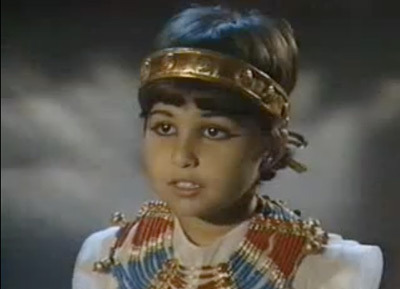
There's Sahu!
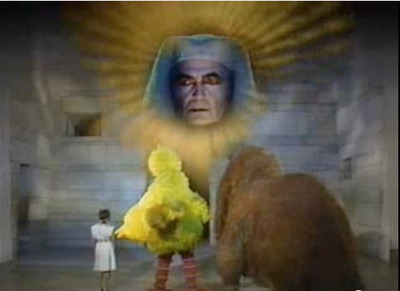
ACTUAL DIALOGUE from Big Bird: "Oh no! The demon's gonna be here any second now!" And here's the appearance of that demon, played by James motherfucking Mason.
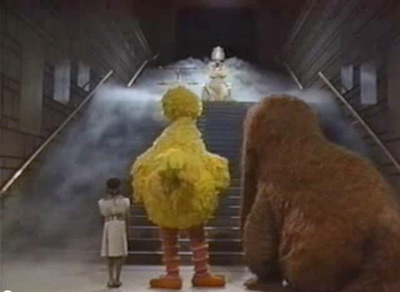
The demon's question is, "Where does today meet yesterday?" You'd think that after four fucking thousand years the kid would have randomly guessed "at midnight" or "at the Motion Picture Association of America." Big Bird and Snuffy finally guess "in a museum," and after 4,000 years of bodiless exile, Sahu is deemed worthy to proceed to the weighing of his soul. Big Bird and Snuffy go with him to stand in the Hall of Two Truths at the gate to the afterlife. The gigantic foam balls on these guys! Sure, Elmo loves you, but when's the last time Elmo held anyone's hand on the threshold of eternal night?
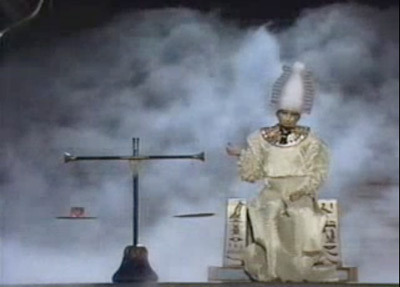
We get a simplified version of the Egyptian passage of the dead. Sahu's heart will be weighed against a single feather; only if the heart is lighter will he be allowed to proceed. That's it. Even after answering the damn question he only gets one shot at this, on penalty of being an earthbound spirit forever (this is sort of, but only sort of gentler than the traditional version of the process, in which the unworthy heart would be devoured for all time by this guy). Also, traditionally, this celestial Breathalyzer test was administered by Anubis. Here it's Osiris. Osiris had many hidden and secret names, one of which was Dude Filling In For Anubis Even Though He's Total Fucking Failcakes at Stuff Anubis Does.

Osiris says, "Let the feather appear!" The feather does not appear, and after a few really awkward seconds, Osiris says that the test cannot be held, he's sorry for the inconvenience, and by the way Sahu is boned forever. He gets up to leave, when Big Bird yells, "Wait! Use one of mine!" So Sahu's heart is weighed against one of Big Bird's canary-yellow feathers, but the depraved indifference of the gods has understandably crushed his spirit, so the heart is weighed down with sadness. Osiris once again proclaims that Sahu is never gonna get it (not this time), never ever gonna get it.
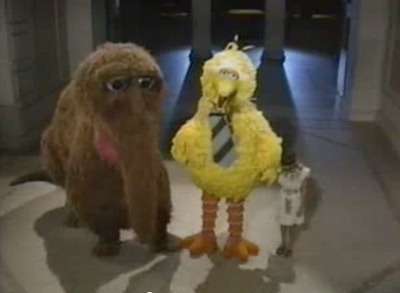
To which Big Bird interjects: "That's not fair!" I am absolutely not fucking kidding. This is the part of the program where Big Bird defies a god and argues justice for the tormented soul of his little buddy (incidentally, what the hell did this six-year-old DO in the 21st century BC to earn restless eternal damnation?). Big Bird scolds Osiris for his coldness and refuses to allow the ceremony to conclude until Sahu's heart kicks that feather's ass. You think you know a Muppet... but it's plain that we've had Big Bird figured all wrong. He's no kindergartener. He's a previously unknown aspect of the Eternal fucking Champion.
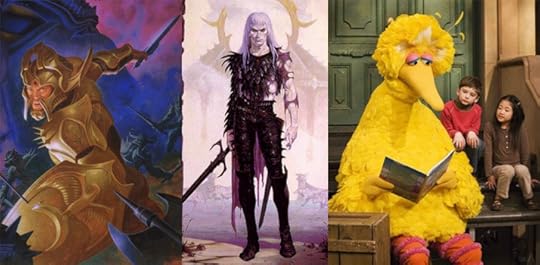
PICTURED LEFT TO RIGHT: Same dude.
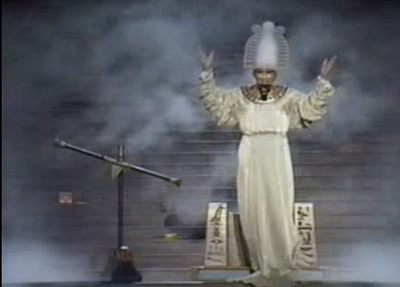
Osiris is no dummy! He quickly realizes that if he doesn't get with the program, this giant bird is going to pull out a Runeblade and smash him in the balls. Look! The heart is lighter than the feather! Sahu can proceed to the afterlife! OH SEKHMET H. CHRIST, PLEASE DON'T KILL ME.
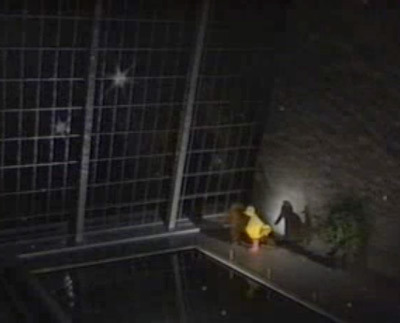
Big Bird and Snuffy watch contentedly as Sahu transcends his hellish half-death and rises into the sky to take the form of a star, just beneath the stars representing his parents.
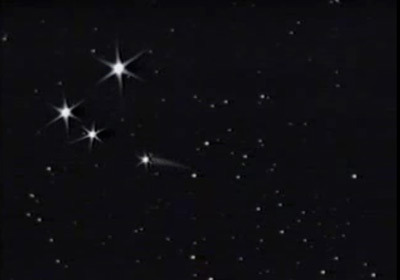
And what's this? That's Sahu's cat taking a place in the family constellation. Yes, Osiris was so scared that Big Bird was gonna punch his ticket for the motherfucking pain train, he let the cat go, too. The end! Tune in next time, when Cookie Monster will teach counting to six.
There are too many Sesame Street specials to count, and most of them have climactic revelations along the lines of, "Oscar learns that not everyone likes a grouch" or "Elmo learns the real value of sharing." Yet once, just once, a bunch of writers at the Children's Television Workshop actually decided to run with "Big Bird overpowers the will of gods and demons in a quest for celestial justice."
Gods bless them, every one.
For all those years, I just assumed that I was nuts, or that I was conflating a memory of a childhood dream with a childhood television experience. Not long ago, I was trading Sesame Street memories with that girl I like, and I determined to Google-fu my way to the truth.
In the 1983 special Don't Eat the Pictures, assorted humans and Muppets are stuck overnight in the Metropolitan Museum of Art. While Oscar, Bob, Cookie Monster, Olivia, and some small children are having the sort of mild and educational adventures you'd expect, Big Bird and Snuffy meet Sahu, a 4,000-year-old Egyptian prince (!) condemned to wander eternally in spirit form (!!) unless he can answer a riddle posed by a demon (!!!) that appears to him each night at midnight. I am not fucking with you. This really happened.

There's Sahu!

ACTUAL DIALOGUE from Big Bird: "Oh no! The demon's gonna be here any second now!" And here's the appearance of that demon, played by James motherfucking Mason.

The demon's question is, "Where does today meet yesterday?" You'd think that after four fucking thousand years the kid would have randomly guessed "at midnight" or "at the Motion Picture Association of America." Big Bird and Snuffy finally guess "in a museum," and after 4,000 years of bodiless exile, Sahu is deemed worthy to proceed to the weighing of his soul. Big Bird and Snuffy go with him to stand in the Hall of Two Truths at the gate to the afterlife. The gigantic foam balls on these guys! Sure, Elmo loves you, but when's the last time Elmo held anyone's hand on the threshold of eternal night?

We get a simplified version of the Egyptian passage of the dead. Sahu's heart will be weighed against a single feather; only if the heart is lighter will he be allowed to proceed. That's it. Even after answering the damn question he only gets one shot at this, on penalty of being an earthbound spirit forever (this is sort of, but only sort of gentler than the traditional version of the process, in which the unworthy heart would be devoured for all time by this guy). Also, traditionally, this celestial Breathalyzer test was administered by Anubis. Here it's Osiris. Osiris had many hidden and secret names, one of which was Dude Filling In For Anubis Even Though He's Total Fucking Failcakes at Stuff Anubis Does.

Osiris says, "Let the feather appear!" The feather does not appear, and after a few really awkward seconds, Osiris says that the test cannot be held, he's sorry for the inconvenience, and by the way Sahu is boned forever. He gets up to leave, when Big Bird yells, "Wait! Use one of mine!" So Sahu's heart is weighed against one of Big Bird's canary-yellow feathers, but the depraved indifference of the gods has understandably crushed his spirit, so the heart is weighed down with sadness. Osiris once again proclaims that Sahu is never gonna get it (not this time), never ever gonna get it.

To which Big Bird interjects: "That's not fair!" I am absolutely not fucking kidding. This is the part of the program where Big Bird defies a god and argues justice for the tormented soul of his little buddy (incidentally, what the hell did this six-year-old DO in the 21st century BC to earn restless eternal damnation?). Big Bird scolds Osiris for his coldness and refuses to allow the ceremony to conclude until Sahu's heart kicks that feather's ass. You think you know a Muppet... but it's plain that we've had Big Bird figured all wrong. He's no kindergartener. He's a previously unknown aspect of the Eternal fucking Champion.

PICTURED LEFT TO RIGHT: Same dude.

Osiris is no dummy! He quickly realizes that if he doesn't get with the program, this giant bird is going to pull out a Runeblade and smash him in the balls. Look! The heart is lighter than the feather! Sahu can proceed to the afterlife! OH SEKHMET H. CHRIST, PLEASE DON'T KILL ME.

Big Bird and Snuffy watch contentedly as Sahu transcends his hellish half-death and rises into the sky to take the form of a star, just beneath the stars representing his parents.

And what's this? That's Sahu's cat taking a place in the family constellation. Yes, Osiris was so scared that Big Bird was gonna punch his ticket for the motherfucking pain train, he let the cat go, too. The end! Tune in next time, when Cookie Monster will teach counting to six.
There are too many Sesame Street specials to count, and most of them have climactic revelations along the lines of, "Oscar learns that not everyone likes a grouch" or "Elmo learns the real value of sharing." Yet once, just once, a bunch of writers at the Children's Television Workshop actually decided to run with "Big Bird overpowers the will of gods and demons in a quest for celestial justice."
Gods bless them, every one.
Published on February 29, 2012 00:24



